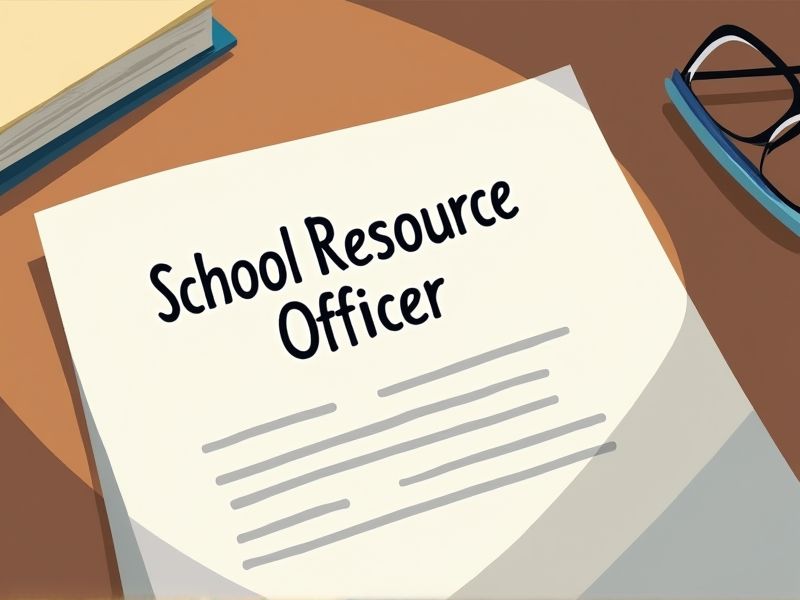
A School Resource Officer (SRO) plays a crucial role in maintaining a safe and secure learning environment, which directly impacts students' ability to focus and achieve academic success. Due to the complex nature of their responsibilities, SROs must be equipped with a specific set of skills to effectively manage various situations, ranging from counseling to crisis management. Proper certifications ensure officers have the necessary training to foster a positive relationship with students and staff while enhancing overall school safety. Below are key certifications that may be required for a School Resource Officer.
Basic Law Enforcement Certification
Basic Law Enforcement Certification is needed for a School Resource Officer to ensure they possess the foundational skills and knowledge required for safety and law enforcement responsibilities within a school setting. This certification ensures that officers are trained in conflict resolution and communication, which are crucial for maintaining a positive and secure school environment. Having certified officers helps schools align with legal standards, providing a safe educational space. The certification also verifies that officers understand relevant legal frameworks, essential for navigating the unique challenges of working in educational institutions.
School Resource Officer Specialized Certification
The specialized certification for School Resource Officers (SROs) ensures they are adequately trained to address the unique challenges within a school environment. Specialized training helps officers effectively manage conflicts and enhance safety through non-confrontational techniques. Certified SROs are better equipped to build trust and foster positive relationships with students, improving overall school climate. This certification ensures SROs remain updated on relevant laws, educational policies, and youth dynamics, reducing the likelihood of mishandling situations.
Crisis Intervention Training Certification
School Resource Officers (SROs) often encounter students in crisis, and Crisis Intervention Training Certification equips them with de-escalation techniques to handle such situations effectively. Schools with SROs trained in crisis intervention report fewer incidents of force being used, which enhances student safety and well-being. Data shows a positive correlation between trained SROs and improved student trust in law enforcement, fostering a supportive school environment. Adequate crisis intervention training reduces the risk of negative outcomes during critical incidents, aligning with best practices in student safety management.
Child Abuse Recognition and Reporting Certification
Child abuse recognition and reporting certification is crucial for school resource officers because they are in a unique position to observe signs of abuse among students. Certification equips officers with the skills to identify subtle indicators that a child may be experiencing harm or neglect. Access to this training ensures officers can effectively collaborate with teachers and counselors to initiate timely interventions. With proper certification, officers contribute to creating a safer school environment and aid in the legal and therapeutic processes that protect at-risk children.
Mental Health First Aid Certification
School Resource Officers (SROs) with Mental Health First Aid Certification can better identify early signs of mental health crises in students, leading to timely and effective interventions. Training equips SROs with the skills to de-escalate potentially volatile situations, reducing the likelihood of physical confrontations. Certified SROs can serve as crucial links between schools and mental health resources, fostering a supportive environment. Their understanding of mental health challenges ensures that students receive appropriate care rather than punitive measures.
Defensive Tactics Certification
Defensive Tactics Certification equips School Resource Officers with skills to effectively manage potentially violent situations, reducing harm to students and staff. Certification ensures officers apply appropriate force, aligning with legal standards and fostering a safer school environment. Proper training in defensive tactics enhances officers' confidence and decision-making skills during crises. Schools benefit from reduced liability and increased trust from parents and educators by having certified officers.
Use of Force Training Certification
Use of Force Training Certification ensures School Resource Officers can effectively handle situations without resorting to unnecessary violence, which promotes a safer school environment. As school incidents can escalate quickly, the certification provides officers with critical decision-making skills to assess and respond appropriately. The presence of a well-trained officer can foster trust between students and law enforcement, enhancing overall school security and community relationships. Legal liabilities are reduced when officers follow standardized protocols, protecting both the school and the officers from potential lawsuits.
Courtroom Procedures and Testimony Certification
School resource officers require courtroom procedures and testimony certification because they often deal with legal situations and must present reliable evidence. This certification ensures they understand legal protocols and can effectively collaborate with the judicial system. It enhances their ability to give credible testimony during court proceedings, thereby supporting the integrity of legal outcomes. Such training helps in maintaining trust between law enforcement and the educational community by ensuring actions adhere to legal standards.
Community Policing Strategies Certification
Community Policing Strategies Certification equips School Resource Officers (SROs) with skills to build trust and meaningful relationships between students and law enforcement, reducing potential tensions. Training in community policing enables SROs to better address diverse student needs, fostering a safer and more inclusive school environment. Certification ensures SROs are informed about the latest strategies to prevent and de-escalate conflicts, enhancing school safety. Increasing awareness and sensitivity to cultural differences through such training helps SROs support positive student interactions and engagement.
Juvenile Justice and Youth Intervention Certification
The Juvenile Justice and Youth Intervention Certification equips School Resource Officers with the necessary skills to effectively interact with youth, fostering a safer school environment. Without specialized training, officers might misinterpret adolescent behavior, potentially escalating rather than resolving situations. Knowledge of juvenile justice laws ensures that legal proceedings involving minors are handled correctly. This certification supports positive relationship-building between officers and students, promoting trust and open communication.
Summary
When you ensure School Resource Officers obtain certifications, the school's safety protocols typically improve due to enhanced training. Certified officers can lead to better student trust and stronger relationships within the school community. These qualifications often result in more effective intervention strategies, reducing incidents and promoting a safer environment. Your commitment to certification can also enhance the school's reputation for safety and preparedness.
